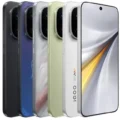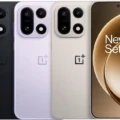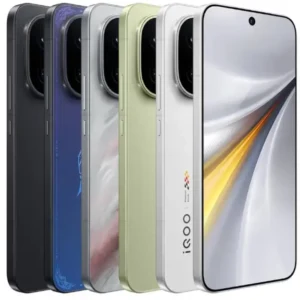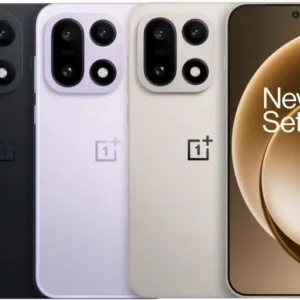- All Product
- Compare
iQOO 15 Specifications and Price in India vs OnePlus 15 Price in India Launch Date
General
| Device Type | Iqoo Mobile OnePlus Mobile |
| Model | iQOO 15 OnePlus 15 |
| Price | 59900 45000 |
| Released | 26 November, 2025 13 November, 2025 |
| Status | Coming Soon Coming Soon |
Design
| Type Design Type called form factor refers to a mobile phone's size, shape, and style as well as the layout and position of major components of phone. There are three major form factors seen in mobile phones => bar phones, folding phones and sliding phones. | Bar Bar |
| Thickness | 8.10 mm 8.10 mm |
| Weight | 220g 211 grams |
| Height | 163.65 mm 161.42 mm |
| Width | 76.80 mm 76.67 mm |
| Protection | Water resistant, IP68, IP69, (up to 30 minutes in a depth of 1.5 meter) Water resistant, IP68, IP66, IP69K, IP69, (up to 30 minutes in a depth of 1.5 meter), Dust proof |
| Colors | Sliver, Black Back: Crystal Shield Glass, Glass Fiber |
Network
| 4G Network |
TD-LTE 2600(band 38) / 2300(band 40) / 2500(band 41) / 2100(band 34) / 1900(band 39) / 3500(band 42) / 3700(band 43) / 3500(band 48) FD-LTE 2100(band 1) / 1800(band 3) / 2600(band 7) / 900(band 8) / 700(band 28) / 1900(band 2) / 1700(band 4) / 850(band 5) / 850(band 18) / 850(band 19) / 800(band 20) / 1900(band 25) / 850(band 26) / 1700(band 66) TD-LTE 3500(band 48) / 2600(band 38) / 2300(band 40) / 2500(band 41) / 2100(band 34) / 1900(band 39) / 3500(band 42) FD-LTE 1700(band 66) / 2100(band 1) / 1800(band 3) / 2600(band 7) / 900(band 8) / 700(band 28) / 1700(band 4) / 850(band 5) / 850(band 18) / 850(band 19) / 800(band 20) / 850(band 26) |
| 5G Network |
5G bands FDD N1 / N2 / N3 / N5 / N7 / N8 / N18 / N20 / N25 / N26 / N28 TDD N38 / N40 / N41 / N48 / N66 / N75 / N77 / N78 / N80 / N81 / N83 / N84 / N89 FDD N1 / N3 / N5 / N7 / N8 / N20 / N26 / N28 TDD N38 / N40 / N41 / N48 / N66 / N77 / N78 / N79 / N80 / N81 / N83 / N84 / N89 |
| SIM SIM (Subscriber Identity Module) is a small card that contains mobile network subscriber's account information. This allows the phone using the card to attach to a mobile network. The SIM card is most commonly associated with GSM and UMTS mobile networks. Moving a SIM card from one phone to another allows a subscriber to switch mobile phones without having to contact their mobile network carrier. SIM cards can also be used by a phone to store limited amounts of data, such as phone numbers and text messages. | Nano SIM Nano SIM |
| Dual SIM | Yes Yes |
Display
| Display Type Display Technology => A number of display technologies and types used in mobile phones => TFT (Thin Film Transistor), IPS (In-Place Switching), OLED (Organic Light Emitting Diode), AMOLED (Active-Matrix Organic Light-Emitting Diode), Super AMOLED (an even advanced version of AMOLED), Resistive Touchscreen (Resistive touchscreens contain two layer of conductive material with a very small gap between them which acts as a resistance), Capacitive Touchsceen (Capacitive touchscreen technology consists of a layer of glass coated with a transparent conductor) | LTPO AMOLED (Curved Display) LTPO AMOLED Gorilla Glass |
| Size | 6.85 inches (17.4 cm) 6.78 inches (17.22 cm) |
| Resolution | 1440x3168 px (QHD+) 1272x2772 px (FHD+) |
| Refresh Rate | 144 Hz 165 Hz |
| HBM Brightness | 2600 nits 1800 nits |
| Peak Brightness | 6000 nits 800 nits |
| Pixel Density Pixel Density (PPI) is refers to the concentration of pixels on a particular display, measured in pixels per inch (ppi). Pixel density is calculated by dividing the diagonal pixel resolution of a display by its diagonal size, higher pixel density better display quality. | 508 ppi 450 ppi |
| HDR Mode |
Media
| Audio Jack | |
| Video Resolution | 2160p @30fps, 3840×2160 pixels 2160p @30fps, 3840×2160 pixels |
Camera
| Primary Camera is able to capture photographs and usually videos, The most important characteristics of a camera are the resolution (measured in megapixels), lens focus type (fixed or automatic), higher megapixel cameras are known to capture higher quality photos, but not always a good measurement of the photos quality. | 50 MP f/1.88 Wide Angle 1/1.56" 1µm 50MP |
| Secondary Camera | 50 MP f/2.05 Ultra-Wide Angle 1/2.76" 0.64µm 50MP |
| Tertiary Camera | 50 MP f/2.65 Periscope 1/1.95" 0.8µm upto 100x Digital Zoom, upto 3x Optical Zoom 50MP |
| Image | 8150 x 6150 Pixels 8150 x 6150 Pixels |
| Video | 7680x4320 @ 30 fps 3840x2160 @ 24 @ 30 @ 60 fps 1920x1080 @ 30 @ 60 @ 120 @ 240 fps 7680x4320 @ 30 fps 3840x2160 @ 30 @ 60 @ 120 fps 1920x1080 @ 30 @ 60 @ 240 fps 1280x720 @ 30 @ 240 @ 480 fps |
| Flash Flash Light => There is commonly two types of flash lights are used in camera mobile phones, LED Flash (LED flash offers lower power consumption with drive circuitry that takes up very little room, LEDs can be strobed faster than any other light source), Xenon Flash (xenon flash produces an extremely intense full-spectrum white light for a very short duration) | LED Flash LED Flash |
Software
| Operating System OS => Every computer system run on a base software called Operating System (OS). Operating System controls all basic operations of the computer (such as smartphone, PDAs, tablet computers and other handheld devices). The Operating System allows the user to install and run third party applications (apps), apps are used to add new functionality to the device. | Android v16 Android v16 |
| Custom UI | Origin OS Color OS |
Hardware
| Chipset Chipset is a group of integrated circuits designed to perform one or a more dedicated functions, often with real time computing constraints, Popular smartphones are equipped with more advanced embedded chipsets that can do many different tasks depending on their programming. | Qualcomm Snapdragon 8 Elite Gen 5 SM8850-AC Qualcomm Snapdragon 8 Elite Gen 5 SM8850-AC |
| CPU CPU (Central Processing Unit) mostly known as processors, CPU processes instructions in order to carry out certain functions that make your device operate properly. Processors are often described as the brain of computers, smartphones and tablets, Smartphones and tablets rely on processors to carry out their every task, Processors are an incredibly important factor in selecting any type of computing device, including your smartphone. | Octa core (4.6 GHz, Dual core, Oryon + 3.62 GHz, Hexa Core, Oryon) Octa core (4.6 GHz, Dual core, Oryon + 3.62 GHz, Hexa Core, Oryon) |
| RAM (Memory) RAM (Random Access Memory) is a type of computer memory that can be accessed randomly, any byte of memory can be accessed without touching the preceding bytes that allows information to be stored and accessed quickly from random locations. RAM is the most common type of memory found in computer systems, smartphones, tablets and other electronic devices. | 12 GB 12 GB |
| Internal Storage Internal Storage is a data storage space (flash memory) mostly used in smartphones, tablets and other electronic devices where operating system, apps, music, photos, videos, files and other user data Is stored. | 256GB 256GB |
| Sensors Sensors are electronic components that detects and responds to some type of input from the physical environment. The specific input could be light, heat, motion, moisture, pressure and location, The output is generally a signal that is converted to use in computing systems, a location sensor, such as a GPS receiver is able to detect current location of your electronic device. | Light sensor, Proximity sensor, Accelerometer, Compass, Gyroscope |
Connectivity
| Bluetooth Bluetooth is a wireless communications technology for exchanging data between mobile phones, headsets, computers and other network devices over short distances without wires, Bluetooth technology was primarily designed to support simple wireless networking of personal consumer devices. | v6.0 |
| Infrared Infrared connectivity is an old wireless technology used to connect two electronic devices. It uses a beam of infrared light to transmit information and so requires direct line of sight and operates only at close range. | |
| Wi-fi Wi-Fi is a popular wireless networking technology using radio waves to provide high-speed network connections that allows devices to communicate without cords or cables, Wi-Fi is increasingly becoming the preferred mode of internet connectivity all over the world. | Wi-Fi 7 (802.11 a/b/g/n/ac/be/ax) 5GHz, MIMO Wi-Fi 7 (802.11 a/b/g/n/ac/be/ax) 5GHz, MIMO |
| Wi-fi Hotspot | |
| USB | Type-C Type-C |
| GPS GPS The Global Positioning System is a satellite-based radio navigation system, GPS permits users to determine their position, velocity and the time 24 hours a day, in all weather, anywhere in the world, In order to locate your position, your device or GPS receiver must have a clear view of the sky. | |
| NFC NFC (Near field communication) is a set of standards for smartphones and similar devices to establish peer-to-peer radio communications with each other by touching them together or bringing them into proximity, usually no more than a few inches. | |
| HDMI HDMI (High-Definition Multimedia Interface) is a compact audio/video interface for transferring uncompressed video data and compressed or uncompressed digital audio data from a HDMI-compliant source device to a compatible computer monitor, video projector, digital television, or digital audio device. | |
| Wireless Charging Wireless Charging (Inductive Charging) uses an electromagnetic field to transfer energy between two objects. This is usually done with a charging station. Energy is sent through an inductive coupling to an electrical device, which can then use that energy to charge batteries or run the device. | Yes, 40W Wireless Charging Yes, 50W Wireless Charging |
Battery
| Battery Type Battery Type => Cell phones run on various kinds of batteries depending on the manufacturer, phone size or shape and features. There are basically four types of cell phone batteries => Lithium Polymer, Lithium Ion, Nickel Metal Hydride and Nickel Cadmium. | Li-Ion (Lithium Ion) SiC (Silicon Carbon) |
| Capacity Battery Capacity is a measure (typically in Amp-hr) of the charge stored by the battery, and is determined by the mass of active material contained in the battery. The battery capacity represents the maximum amount of energy that can be extracted from the battery under certain conditions. | 7000 mAh 7300 mAh |
| Wireless Charging Wireless Charging (Inductive Charging) uses an electromagnetic field to transfer energy between two objects. This is usually done with a charging station. Energy is sent through an inductive coupling to an electrical device, which can then use that energy to charge batteries or run the device. | 40W Wireless Charging Yes, 50W Wireless Charging |
| Quick Charging | 100W Ultra Charging Yes, 120W Super Flash Charging, 50% in 15 minutes |



|
Disclaimer Note
You can write your own disclaimer from APS Settings -> General -> Disclaimer Note.


